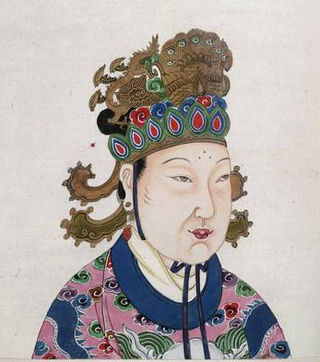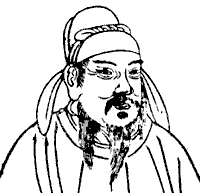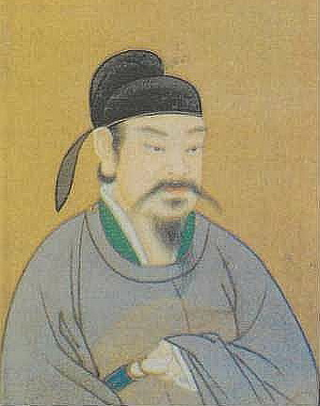
Wu Zetian, personal name Wu Zhao, was Empress of China from 660 to 705, ruling first through others and then in her own right. She ruled first as empress consort, through her husband Emperor Gaozong and then as an empress dowager, through her sons Emperors Zhongzong and Ruizong, from 660 to 690, not unprecedented in Chinese history. She subsequently founded and ruled as female emperor of the Wu Zhou dynasty of China from 690 to 705. She was the only female sovereign in the history of China widely regarded as legitimate. Under her 45-year reign, China grew larger, becoming one of the great powers of the world, its culture and economy were revitalized, and corruption in the court was reduced. She was eventually removed from power during a coup and died a few months later.

Emperor Zhongzong of Tang, personal name Li Xian, and at other times Li Zhe or Wu Xian, was the fourth and seventh emperor of the Tang dynasty of China, ruling briefly in 684 and again from 705 to 710. During the first period, he did not have actual power, which was in the hands of his mother, Empress Wu Zetian and he was overthrown on her orders after opposing his mother. During his second reign, most of the power was in the hands of his consort Empress Wei.

Emperor Ruizong of Tang, personal name Li Dan, also known at times during his life as Li Xulun, Li Lun, Wu Lun, and Wu Dan, was the fifth and ninth emperor of the Chinese Tang dynasty. He was the eighth son of Emperor Gaozong and the fourth son of Emperor Gaozong's second wife Empress Wu. He was wholly a figurehead during his first reign when he was controlled by his mother, and he was the titular and puppet ruler of the Tang Empire from 684 to 690. During his second reign after his mother's death, significant power and influence was exercised by his sister Princess Taiping.
The chancellor was a semi-formally designated office position for a number of high-level officials at one time during the Tang dynasty of China. This list also includes chancellors of the short-lived Wu Zhou dynasty, which is typically treated as an interregnum of the Tang dynasty by historians.
Wu Chengsi, courtesy name Fengxian, formally Prince Xuan of Wei (魏宣王), was a nephew of the Chinese sovereign Wu Zetian and an imperial prince of the Wu Zhou dynasty. He participated in her planning in taking the throne and had wanted to become crown prince after she claimed the throne in 690, but his attempts were repeatedly rebuffed, and after she showed her intent to eventually return the throne to her son Li Zhe by recalling Li Zhe from exile in 698, Wu Chengsi died in disappointment.
Zhang Yizhi, formally the Duke of Heng (恆公), nickname Wulang (五郎) and Zhang Changzong, formally the Duke of Ye (鄴公), nickname Liulang (六郎), were two brothers who served as officials of Wu Zetian's Zhou Dynasty and became very powerful late in her reign. Both brothers were killed in a coup that overthrew Wu Zetian in 705.
Li Zhaode (李昭德) was a Chinese politician in Wu Zetian's Zhou dynasty and at one point served as chancellor. He was known for his abilities and strong will, which eventually led to a conflict with Wu Zetian's secret police official Lai Junchen. Li Zhaode was executed via decapitation on the same day as Lai, who was in turn accused by others of treason.
Yao Shu (姚璹) (632–705), courtesy name Lingzhang (令璋), formally Count Cheng of Wuxing (吳興成伯), was a Chinese politician of the Tang and Wu Zetian's Zhou dynasty, serving twice as chancellor during Wu Zetian's reign.
Lou Shide, courtesy name
Lu Yuanfang (陸元方), courtesy name Xizhong (希仲), was an official of Wu Zetian's Zhou Dynasty, twice serving as chancellor.
Doulu Qinwang, né Lu Qinwang, formally Duke Yuan of Rui (芮元公), was a Chinese official of the Tang dynasty and the Wu Zhou dynasty, serving several terms as chancellor during the reigns of Wu Zetian and her son Emperor Zhongzong.
Su Weidao, was an official of the Chinese Tang dynasty and Wu Zetian's Zhou dynasty, twice serving as chancellor during Wu Zetian's reign.
Li Daoguang (李道廣), courtesy name Taiqiu (太丘), formally Marquess Cheng of Jincheng (金城成侯), was an official of Wu Zetian's Zhou dynasty, serving as chancellor for about two years.
Wu Sansi, known posthumously as Prince Xuan of Liang (梁宣王), was a Chinese prince and politician of the Tang and Wu Zhou dynasties. Wu Sansi served as a chancellor and imperial prince during the reign of his aunt, Empress Wu Zetian of Zhou, and was again a powerful chancellor during the second reign of Empress Wu's son, Emperor Zhongzong of Tang. He was aided in navigating the fraught period that followed Emperor Zhongzong's restoration by successive affairs with the influential consort Shangguan Wan'er and the powerful Empress Wei. Although he amassed significant authority and enjoyed the trust of Emperor Zhongzong, he was killed during an unsuccessful rebellion by the crown prince Li Chongjun in 707.
Li Jiongxiu (李迥秀), courtesy name Maozhi (茂之), was a Chinese military general and politician of the Tang dynasty and Wu Zetian's Zhou dynasty, serving as chancellor during Wu Zetian's reign.
Tang Xiujing, formal name Tang Xuan (唐璿) but went by the courtesy name of Xiujing, formally Duke Zhong of Song (宋忠公), was an official and general of the Chinese Tang dynasty and Wu Zetian's Zhou dynasty, serving as chancellor during the reigns of Wu Zetian, her sons Emperor Zhongzong and Emperor Ruizong and her grandson Emperor Shang.
Wei Chengqing, courtesy name Yanxiu (延休), formally Viscount Wen of Fuyang (扶陽溫子), was an official of the Chinese Tang dynasty and Wu Zetian's Zhou dynasty, serving as a chancellor during Wu Zetian's reign.
Huan Yanfan (桓彥範) (653–706), courtesy name Shize (士則), formally Prince Zhonglie of Fuyang (扶陽忠烈王), briefly known during the reign of Emperor Zhongzong of Tang as Wei Yanfan (韋彥範), was an official of the Chinese Tang dynasty and Wu Zetian's Zhou dynasty, serving as chancellor during the reign of Emperor Zhongzong. He was a key figure in the coup that overthrew Wu Zetian and restored Emperor Zhongzong in 705, but was later exiled due to false accusations instigated by Wu Zetian's nephew Wu Sansi and killed in exile in a cruel manner.